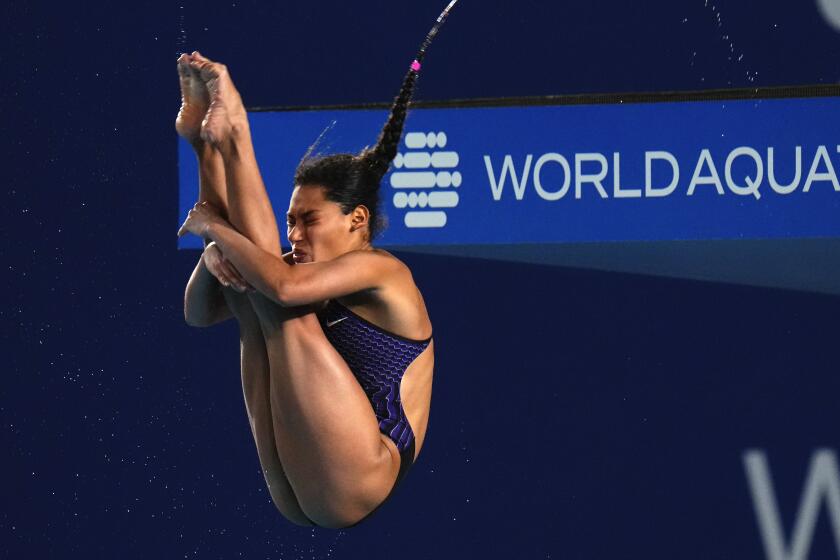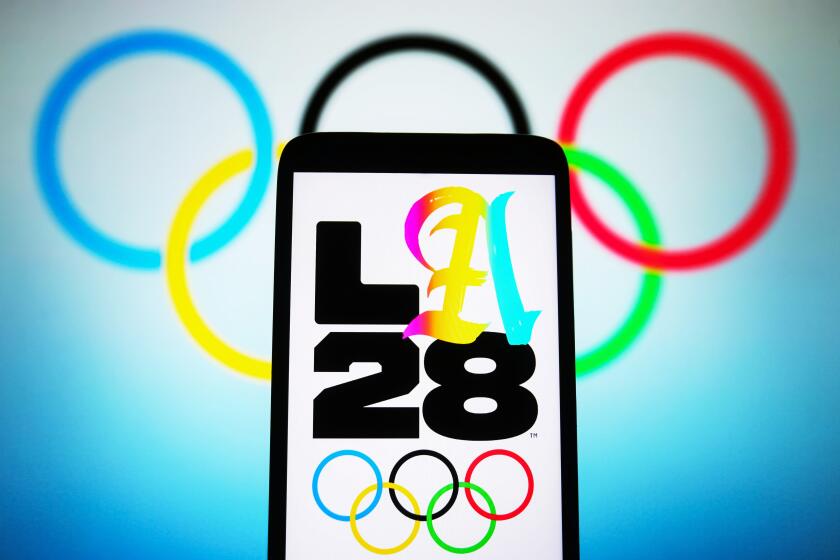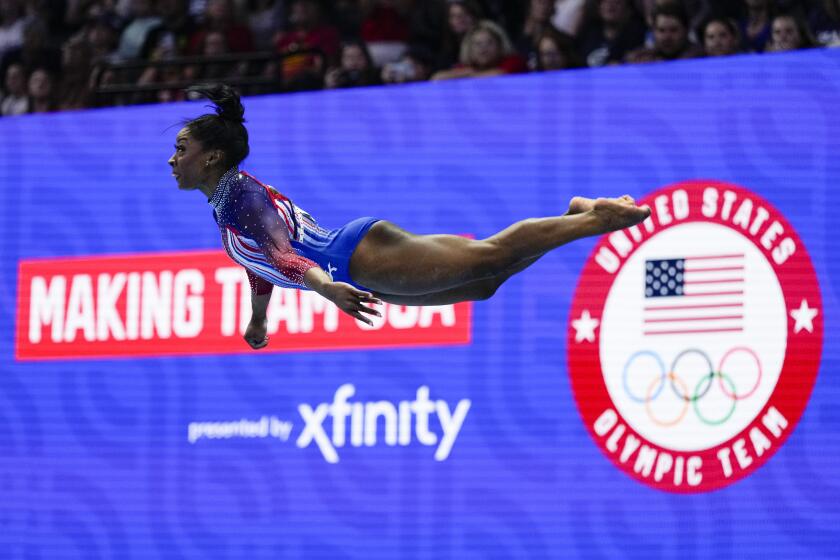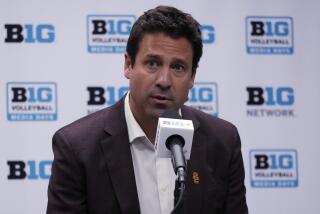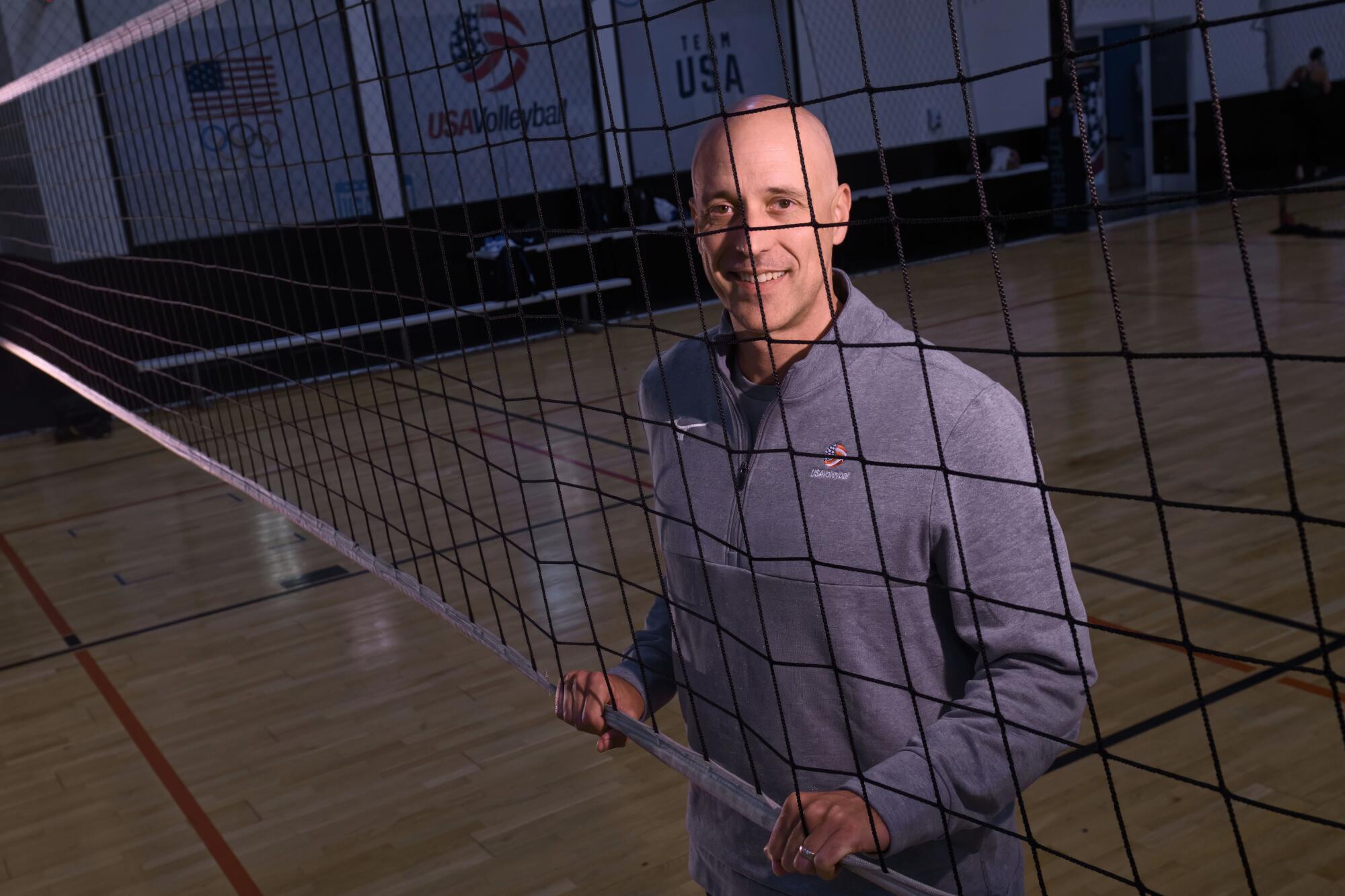
The court at Walter Pyramid was still covered in confetti. Fans hadn’t yet spilled into the Long Beach State parking lot on a sunny Saturday afternoon. UCLA players were still basking in the glory of a second consecutive national title when John Speraw, who was equal parts emotionally exhausted and elated, sat down for the postmatch news conference.
The UCLA head coach locked eyes with a USA Volleyball staff member sitting in the audience.
“See you Monday,” the staff member said with a grin.
Speraw didn’t have time to waste. Days after leading the Bruins to their first consecutive NCAA championships since 1995-96, Speraw traded his blue and gold for red, white and blue as the United States prepared for the Paris Olympics. The Americans, chasing their first Olympic medal since 2016, begin pool play on July 27.
Amid budget woes that led to one of her Mexican diving teammates to raise money on OnlyFans, Gaby Agúndez is overcoming all obstacles to win gold in Paris.
Entering his third Olympic Games as the national team head coach, Speraw has perfected the balance of two jobs that leave him constantly short on time. Even after the national team got on the court for a recent practice at its training facility in Anaheim, Speraw was on a phone call while snaking through groups of players during warmups.
It seems chaotic. It’s also where Speraw thrives.
“This has been just a tremendous experience to represent your nation and coach this team and be able to coach at UCLA,” Speraw said while wearing a USA volleyball quarter-zip and clutching a UCLA volleyball thermos. “I don’t know how much better it can get.”
Speraw never intended to stay in this double life for this long. The national team post always felt like a four-year job, Speraw said. A college position could last a lifetime if executed correctly. So when Speraw left UC Irvine in 2012 after 10 years and three NCAA championships to take over at UCLA, he did so thinking he chose his alma mater over a chance to be the head coach of the national team.
One year later, he got a call from USA Volleyball.
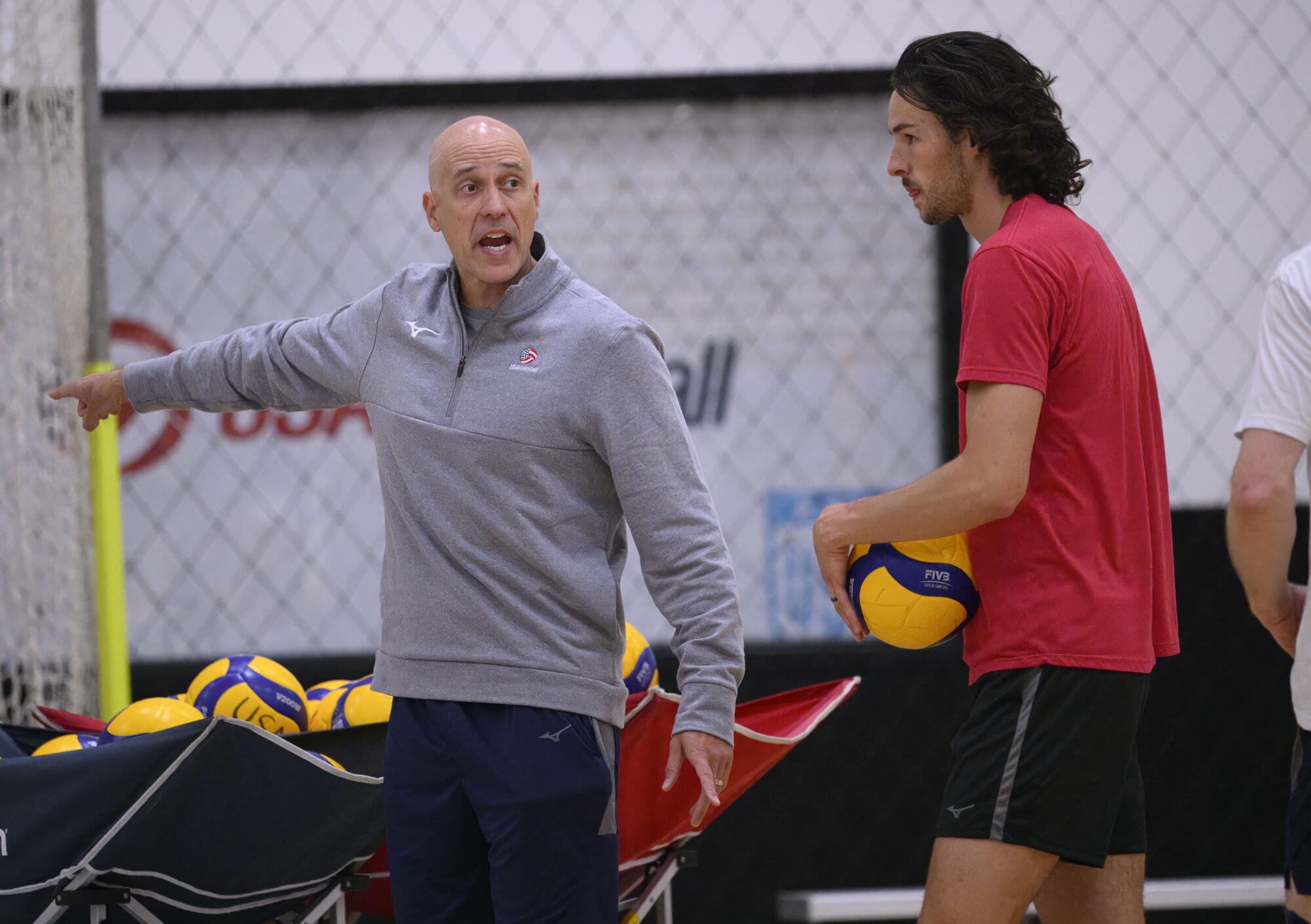
“This team has achieved a lot and then I think [with] the disappointment of that Olympics — I just want for them another shot.”
— John Speraw, U.S. men’s volleyball coach
The international schedule shifted some major competitions, which reduced overlap with the collegiate season and made the dual role a better possibility. While Speraw’s national team predecessor Alan Knipe took a sabbatical from Long Beach State leading up to the 2012 Games, Speraw has toggled between both roles for more than a decade. The pattern is mirrored on the women’s side, where Karch Kiraly leads the women’s national team for a third Olympic cycle. Kiraly and Speraw are the first to serve as head coaches for the women’s and men’s national teams, respectively, for three consecutive Olympics.
For Speraw, the consistency makes the transition from the UCLA season that ends in May to the national team season in the summer feel like “an annual reunion.”
“It energizes me,” said Speraw, 52.
Now on his fifth consecutive Olympic cycle with the senior national team — two as an assistant and three as the head coach — Speraw has seen national team players grow through seasons of life in ways most in his position did not. Opposite Matt Anderson has grown from being the youngest player on the 2012 squad at 25 years old to a four-time Olympian and married father of two.
Anderson admits he is “kind of a recluse in a lot of ways,” but the six-time USA Volleyball male indoor player of the year considers Speraw a friend.
“He’s not a player, but he’s been in big situations and understands the pressures that come with it,” Anderson said. “Now having a family and compartmentalizing that and how that affects you on the court and off the court … all these intangibles that you don’t really think of, he’s been with me through that journey.”
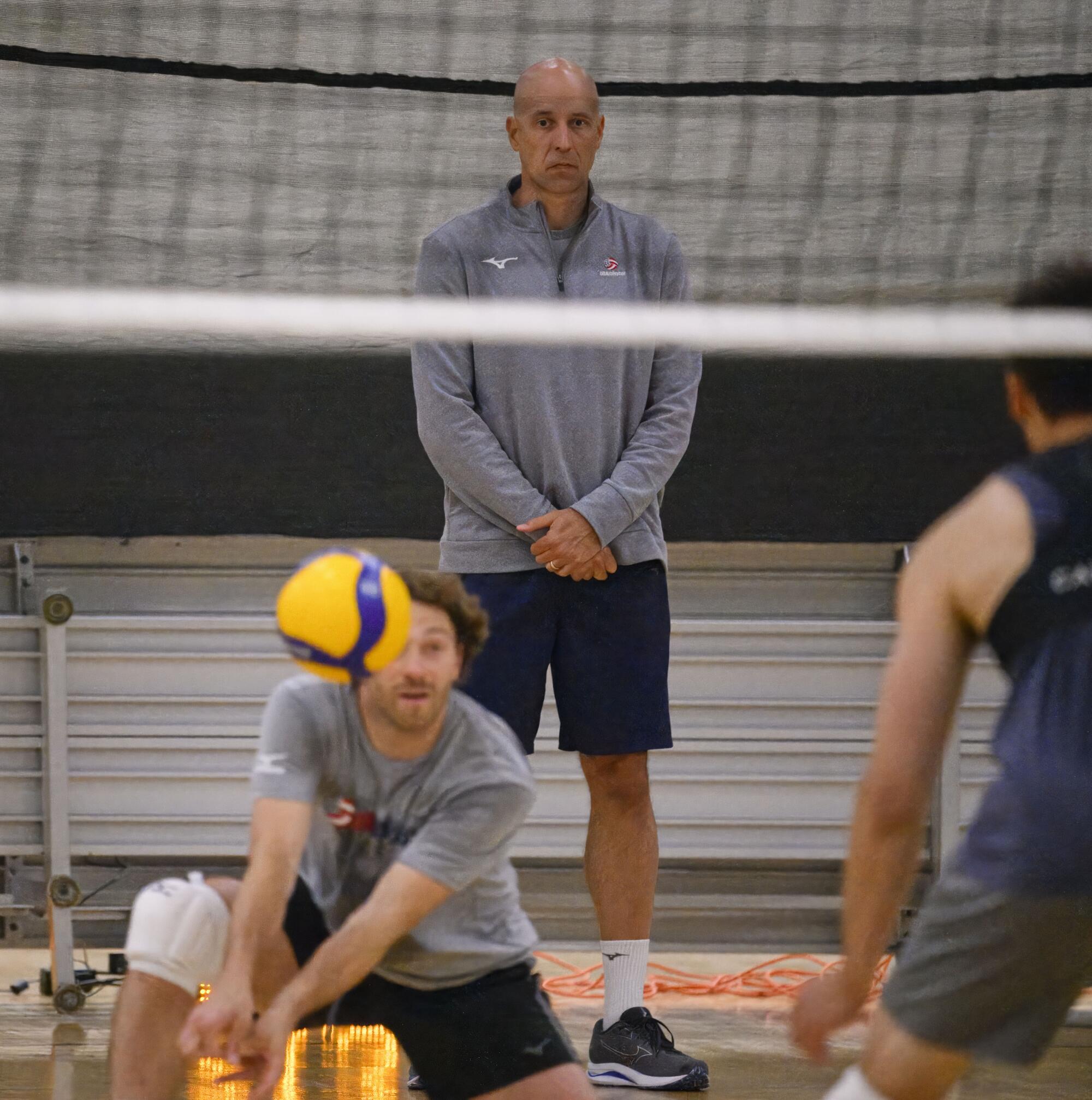
Speraw has “always been a teacher at heart,” said middle blocker David Smith, who starred at UC Irvine under Speraw. It’s what allows the coach to thrive in a collegiate setting, where he is enforcing volleyball basics to promising prospects while also helping the college athletes navigate major life milestones such as living away from home for the first time, buying their first suits and ties or even learning how to do laundry.
But with professionals on the national team, Speraw has learned to take a back seat.
With a veteran-laden roster that features nine of 12 players playing in at least a second Olympic Games, Speraw finds himself leaning into timeouts and simply listening. He can appreciate the high-level IQ and communication of a team that has players who boast more than a decade of international experience.
“He’ll be very curious on our thoughts on what international things players are doing because we’re in it a little bit more than he is,” said setter Micah Christenson, who is entering his third Olympics. “He’s got another job so he does a great job of deferring some of that to some of his staff, but also to the players that are in it and living it.”
The Los Angeles 2028 Olympic organizing committee is entering the final and toughest stage of its long life — turning the Games into a reality.
Solidifying the national team coaching structure was paramount to ensuring Speraw could hold both roles. The national team used to have a head coach and a full-time assistant with a part-time assistant coach coming in for the final two years of an Olympic cycle. With Speraw splitting his duties, USA Volleyball reallocated salaries and reorganized the structure to include two full-time assistants for the entire quad.
When Speraw is at UCLA, U.S. assistant coach Matt Fuerbringer handles day-to-day duties with fellow assistant Javier Weber.
When the Bruins begin their limited-hour offseason workouts, UCLA assistants, led by Nick Vogel, run practices while Speraw finishes the international season.
“People ask me how I do both jobs; there are CEOs out there that run $100-million companies with hundreds of employees. If they can do it, we can do it,” Speraw said. “But they do it, much like we’ve tried to construct it here, and that is you’ve got exceptional senior vice presidents. I’ve got exceptional assistant coaches in both programs.”
Speraw has been in constant motion since he was a student majoring in microbiology and molecular genetics at UCLA while helping the Bruins win two national titles. He began his coaching career as a volunteer assistant with the Bruins while also working at UCLA hospital. Even while coaching at UC Irvine, he coached club teams during the summer.
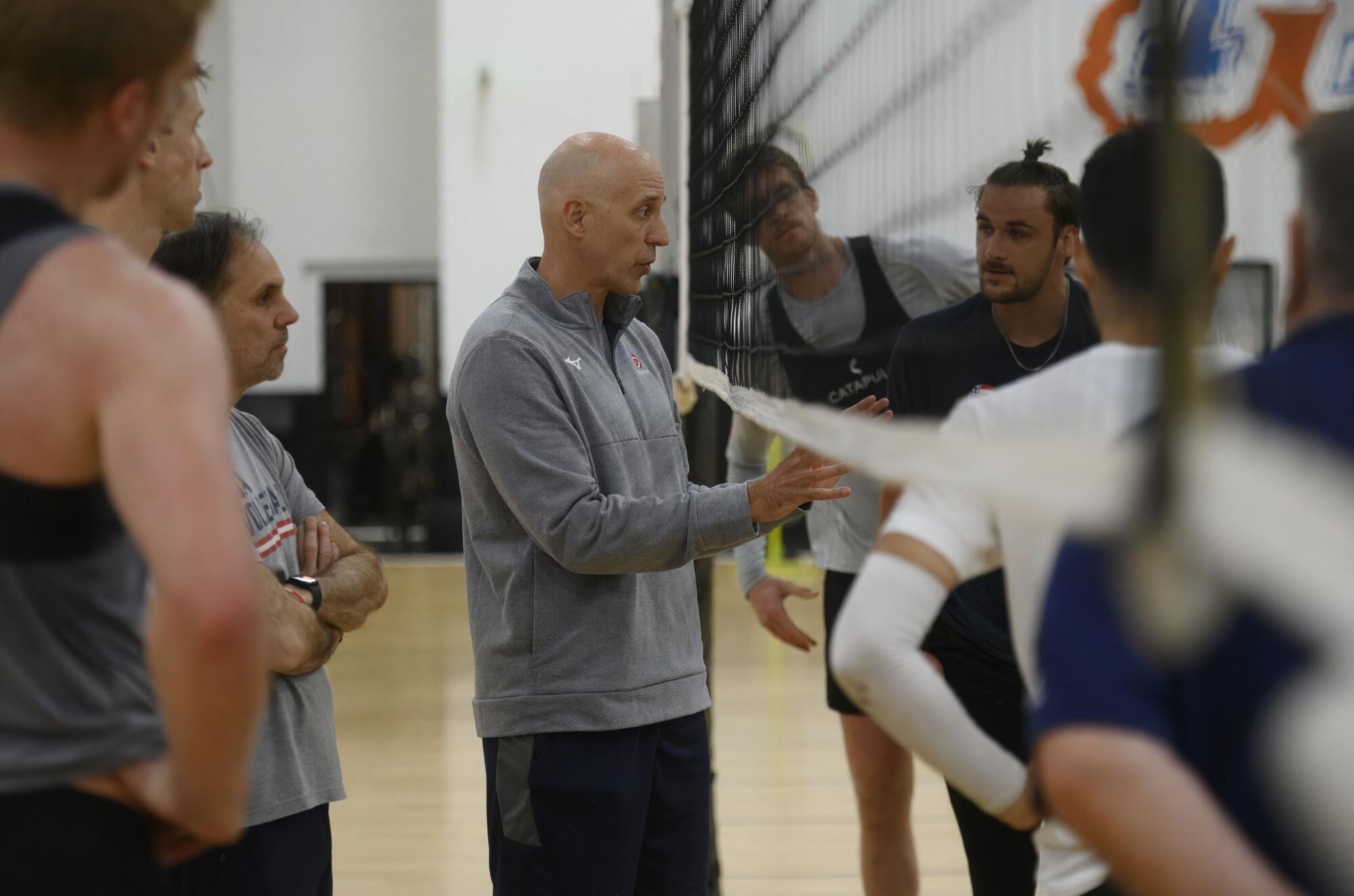
But juggling multiple job titles has taken on a new meaning as Speraw tries to maintain two more important roles: father and husband.
Speraw acknowledged he misses some time with his daughters Brooklyn, 8, and Hailey, 7, but the family, including wife Michelle, also gets unique opportunities together. The girls, who frolicked in the championship confetti after UCLA’s national championship win in Long Beach, are experienced international travelers, Speraw assured. They’re thrilled for Paris.
The United States is aiming for redemption after failing to advance out of pool play in Tokyo for the first time since 2000. Several players entered the 2021 Games believing it was going to be the end of their national team run, Smith said.
Now it’s “one of the reasons we’ve been able to stay together and stay motivated for the last three years,” the 38-year-old added.
The current era of U.S. men’s volleyball — with Speraw at the helm, anchored by stalwarts including Anderson, Smith, Christenson and libero Erik Shoji — already boasts an Olympic medal (bronze 2016), two FIVB World Cup gold medals (2015, 2023) and the United States’ first world championships medal in 24 years (bronze, 2018). Speraw wants to keep adding to the trophy case before closing the book on the modern golden age.
Simone Biles, Jordan Chiles, Suni Lee, Jade Carey and Hezly Rivera will form the 2024 U.S. Olympic women’s gymnastics team competing at the Paris Games.
“This team has achieved a lot and then I think [with] the disappointment of that Olympics — I just want for them another shot,” said Speraw, who, emphasizing his family, acknowledged his own uncertain future regarding the national team with the 2028 Olympics in Los Angeles. “I want them to finish better than they did last time. I want this era to finish with a better result, a better experience, to go out knowing they gave it everything they had and to feel good about what they’ve contributed to USA Volleyball.”
Ensuring the players get a fitting ending is “almost all that I think about,” Speraw said. So consumed by trying to stay focused on his players, Speraw is caught off guard when presented with what else he could soon contribute. He pauses, shakes his head and chuckles softly when he’s reminded of it.
This summer, he could win not only an NCAA championship, but also an Olympic medal.
“Nobody gets to do that,” Speraw said, “and I know I do. … I know how lucky I am.”
More to Read
Go beyond the scoreboard
Get the latest on L.A.'s teams in the daily Sports Report newsletter.
You may occasionally receive promotional content from the Los Angeles Times.

